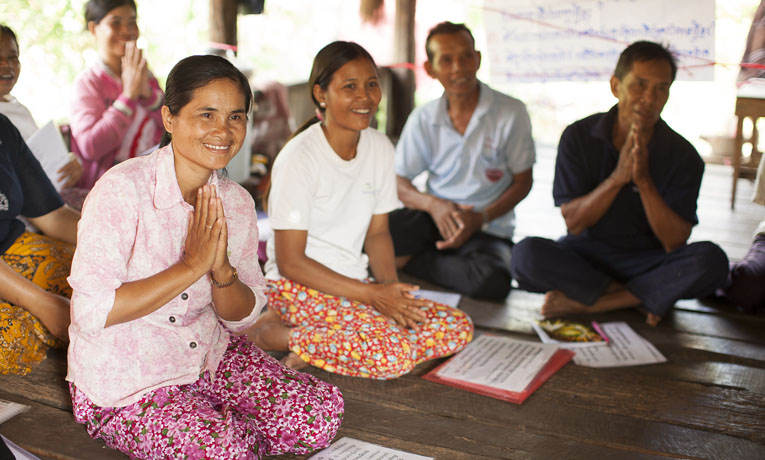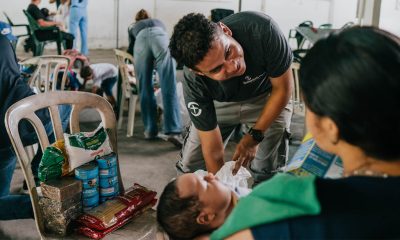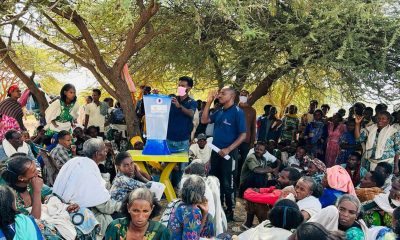Samaritan’s Purse is helping fight exploitation and abuse by educating and training women in Cambodia
Chey Dee couldn’t find work in her small Cambodian village so she started looking for a job in Thailand. During her search, the 17-year-old met a man who promised a good job if she paid him 1,900 baht.
She decided to go with him, even though it meant an illegal border crossing into Thailand.
After two days of non-stop travel, Chey began a job roasting chicken. She was promised 4,000 baht a month, but was never paid. Her manager verbally abused her and only gave her two small meals a day.
“My work experience in Thailand was horrible,” she said. “I was looked down on and was treated like a person would treat an animal. “
Chey found a different job, and as soon as she got her first paycheck began making her way back home. But the police stopped her while she was traveling on a bus. Because she didn’t have the correct papers, they confiscated her money and put her on a small truck to send her back to Cambodia.
After returning to her hometown, Chey heard a radio program put on by Samaritan’s Purse about the dangers of human trafficking. She learned that if she ever went back to Thailand she needed the proper documentation so she could travel safely.
“I am very happy about the radio broadcasts because the lessons that are taught are very important,” Chey said. “Many people do not know the right information for staying safe while migrating, so the lessons are helpful. “
The radio program is just one of the ways Samaritan’s Purse is combating the dangers of human trafficking in Cambodia. Our Safe Migration and Trafficking Awareness (SMTA) project has six main focuses: self-help groups, community groups, education programs in schools, radio shows, information cards, and vocational training.
Samaritan’s Purse is educating and training volunteers to inform their communities about the dangers of trafficking and labor exploitation.
Currently, we have 240 self-help groups in 20 villages. The curriculum is Gospel-centered and teaches not only practical lessons, but also the Word of God. Eight women have professed faith in Jesus Christ through the project.
Each volunteer trained in the self-help groups goes on to educate another 15 households.
“I come because I have a love for God,” said Phalla Puk, one of our volunteers. “We want to be able to learn this for ourselves so that we can pass it on to our communities. It’s important for our families to learn this so that they don’t fall into the difficulties and problems others are facing.”
Naisoy Trik, the volunteer coordinator, said that the program is a means to tell people about God and His love and concern for them.
“I am really happy and really thankful to God that I am able to do this work,” she said. “When I go into the communities, I see the need the people have for our help. There are so many people who need the knowledge about safe migration, trafficking, and also about the love of Christ.”
Samaritan’s Purse is also educating children in 47 schools in three different districts. The lessons focus on topics such as setting future goals, making wise decisions, and migrating safely.
Khea Sreng, director of one of the schools, has seen many students dropping out because they have been offered high salaries abroad, marriage proposals, and other dishonest promises. Some students have no choice as parents often push them to go abroad and work in order to send money back home.
“All of the lessons have been important for us to pass onto our students,” Sreng said. “These issues are real to the people who live here because most participate in illegal migration. People also do not know they should check work licenses before going abroad with agencies to work.”
Beyond spreading knowledge of human trafficking in communities and schools, Samaritan’s Purse has handed out 10,000 information cards near the Thailand/Cambodia border this year.
To further prevent people from migrating for work, we are supporting ministries that train women to make jewelry and other skills to provide an income for them locally.
“We’ve seen God do some things through our projects that are miracles that could have never happened by ourselves,” said Jessica Cope, health and education program manager. “It’s good for people to have the information so that God can work through everyone’s hearts in different ways.”






